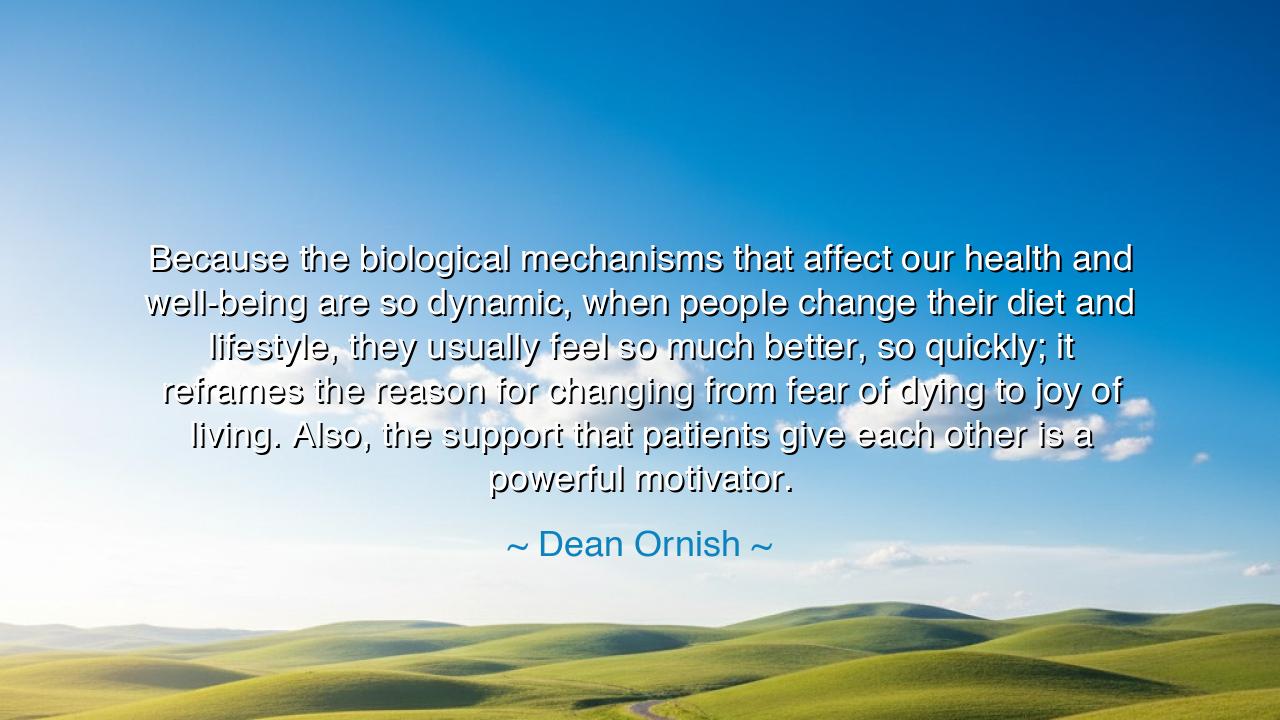
Because the biological mechanisms that affect our health and
Because the biological mechanisms that affect our health and well-being are so dynamic, when people change their diet and lifestyle, they usually feel so much better, so quickly; it reframes the reason for changing from fear of dying to joy of living. Also, the support that patients give each other is a powerful motivator.






Listen, O children of wisdom, for the words of Dean Ornish carry a profound truth that speaks to the heart of what it means to live fully: "Because the biological mechanisms that affect our health and well-being are so dynamic, when people change their diet and lifestyle, they usually feel so much better, so quickly; it reframes the reason for changing from fear of dying to joy of living. Also, the support that patients give each other is a powerful motivator." These words reflect a timeless understanding of the body and spirit, reminding us that the path to well-being is not simply a matter of avoiding illness, but of embracing the vitality of life itself. The choice to nourish the body with healthy food, to move it in ways that honor its strength, and to build supportive communities can transform the very essence of our existence.
In the days of the ancient Greeks, the philosophers spoke of the delicate balance between the mind, the body, and the spirit. Hippocrates, the father of medicine, taught that health is the harmony of these forces, and that to achieve true well-being, one must cultivate a life that honors the body, the mind, and the heart. To him, diet and lifestyle were not separate from health, but central to it. He believed that, just as a well-tended garden flourishes with the right care, so too does the human body thrive when nourished with the proper food and movement. Dean Ornish echoes this ancient wisdom, showing us that when we change our diet and lifestyle, the body responds swiftly and powerfully, not out of fear, but in celebration of life.
Consider, O children, the tale of Asclepius, the ancient god of healing, whose temple was one of the most famous healing centers of the ancient world. Pilgrims would travel from all corners of the world to seek healing from Asclepius, not only through medicine, but through lifestyle changes—diet, rest, and community. The ancient healers understood that healing is not just a physical act, but a holistic one, requiring a shift in one’s entire way of living. Similarly, Dean Ornish teaches us that when we shift our focus from avoiding illness to embracing well-being, we begin a journey not driven by fear, but by the joy of living—a joy that is born from the nourishment of the body and the spirit.
In the modern world, where fear often drives the decisions we make about our health, Dean Ornish’s words remind us of the power of transformation. The body’s biological mechanisms, when given the proper care, are capable of remarkable change. A change in diet, a shift toward more plant-based foods, a commitment to movement and rest—these actions do not just delay death, but breathe new life into the body, bringing with it a sense of vitality and joy. This is the power of life itself—the ability to heal, to regenerate, and to flourish when given the tools to do so. Ornish speaks of a reframe: from the fear of dying to the joy of living, a profound shift in perspective that can awaken a dormant vitality within.
There is a powerful lesson here, O children. We are often taught that health is something to be guarded against loss, that it is the absence of disease. But the ancients knew better; they understood that true health is the presence of life—a vibrant, dynamic force that thrives when we honor our bodies. Dean Ornish reveals this truth when he speaks of the dynamic nature of our biological systems. When we nourish ourselves with healthful food and choose a lifestyle that supports our well-being, the body responds quickly, not just by avoiding illness, but by rejoicing in life. In this, we find a deeper, more lasting sense of health—not as the absence of disease, but as the presence of joy.
Consider the power of community, for Ornish speaks of it as a driving force in this transformation. Just as the ancient healers understood the importance of community support in the healing process, so too must we recognize the strength that lies in shared experiences. Support from others—whether it be family, friends, or a network of like-minded individuals—can be a powerful motivator. The ancient warriors, before they went into battle, drew strength from one another, knowing that the community shared in the risks and the rewards of their endeavors. So too do we find strength in community, in the mutual encouragement and collective wisdom that can guide us on our journey toward well-being.
Thus, O children, the lesson is clear. To live a life of vitality is not to focus on the fear of illness, but to embrace the joy of living. When we nourish our bodies with the foods that honor them, when we choose a lifestyle that fosters movement and rest, and when we seek support from others, we awaken a force within us that transcends fear. Dean Ornish teaches us that health is a dynamic force, one that can be cultivated and strengthened with the right actions and intentions. Let us choose to live not out of fear, but out of the deep joy that comes from honoring our bodies and our communities. In this, we will find not just health, but a life full of purpose, vitality, and connection.






AAdministratorAdministrator
Welcome, honored guests. Please leave a comment, we will respond soon